GALLUP NEWS SERVICE
PRINCETON, NJ --Americans remain highly supportive of the military action in Afghanistan, and are also overwhelmingly supportive of the use of U.S. ground troops in the war. Compared to a month ago, Americans have become more satisfied with the progress of the war, and have become more likely to support the idea of a long-term war against global terrorism that goes beyond just finding those responsible for the Sept. 11 attacks. Three-quarters of Americans favor using U.S. troops to remove Saddam Hussein from power in Iraq.
In early October, just before the military action in Afghanistan began, 49% of Americans said they favored a long-term war against global terrorism, while 43% favored limiting military efforts to finding those responsible for the Sept. 11 attacks. Now, in the latest CNN/USA Today/Gallup poll conducted Nov. 26-27, 62% favor a long-term war, while only 31% say that the war effort should focus just on those responsible for the attacks. (In both polls, only 5% to 6% favor using economic and diplomatic efforts with no military action at all.)
| Which of the following comes closest to your view about the actions the United States should take to deal with terrorism -- [ROTATED: the U.S. should mount a long-term war to defeat global terrorist networks, the U.S. should take military action ONLY to punish specific terrorist groups responsible for the attacks on the World Trade Center, or the U.S. should not take military action but should rely only on economic and diplomatic efforts to deal with terrorism]? |
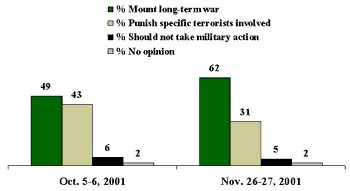 |
| Nov. 26-27, ‘01 |
Fifty-five percent of Americans say it will be necessary to capture Osama bin Laden for the action in Afghanistan to be a success, while a sizable minority -- 41% -- say that it can be a success even if bin Laden is not captured.
Public More Satisfied With Progress of War
There are strong indications in the new poll that the public is becoming more positive about the war's progress.
An early November Gallup poll showed mixed levels of satisfaction with the "progress made by the U.S. military in the war." But that sentiment has changed dramatically since recent reports of the retreat of the Taliban from key Afghan cities and regions. Just 27% of Americans said they were "very satisfied" with the progress of the war in early November, while in the current poll, 58% say they are very satisfied.
| How satisfied are you with the amount of progress made by the U.S. military in the war in Afghanistan -- very satisfied, somewhat satisfied, not too satisfied, or not at all satisfied? |
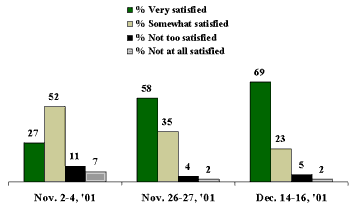 |
| Nov. 26-27, ‘01 |
Almost from the day the terrorist attacks occurred, the public has been resolute in its support for military action against those responsible. A review of over 25 separate questions about military action in Afghanistan asked by 6 different survey organizations since Sept. 11 shows 85% to 90% support across this entire time period.
In the latest poll, approval has increased to 92% -- slightly higher than the 86% recorded by Gallup in early November and the 88% found in mid-October.
| Support for Military Action in
Afghanistan All Polling Organizations, Sept-Nov, 2001 |
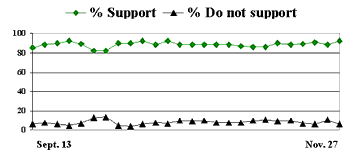 |
Support for the war is at almost universal levels among Republicans nationwide -- 96%. Additionally, 90% of Democrats support the war, as do 88% of independents. In fact, support for the war is high among virtually all sub-groups within American society today, including men and women, all age groups, and people of all levels of education and income.
Bush Job Approval Remains Steady at 87%
The high levels of support for the war are accompanied by continuing high job approval ratings for President George W. Bush. The Nov. 26-27 Gallup poll shows Bush with an 87% approval rating -- marking the eighth consecutive poll since Sept. 11 in which his job approval rating has been in the 86% to 90% range. By way of comparison, former president Bush reached an 89% job approval rating shortly after the Persian Gulf War was declared a victory in early March 1991, but by May his ratings had fallen 15 or more points.
| Presidential Job Approval Do you approve or disapprove of the way George W. Bush is handling his job as president? |
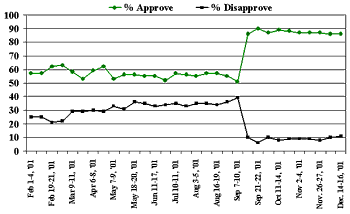 |
| Nov. 26-27, ‘01 |
Ground Troops
In previous polls, Americans have been somewhat less supportive of the use of ground troops than they have been for military action in general. In October, for example, when asked about the use of ground troops in Afghanistan, 80% approved. In early November, a Gallup poll measured support for putting "large numbers of ground troops into combat," and found support lower, at about the two-thirds level.
It is not precisely clear how respondents may have interpreted the "large numbers" clause in this early November question. But we know now that up to 1,000 or more Marines have been or will be sent into Afghanistan. And, in the Monday-Tuesday poll, we find support for the "presence of U.S. ground troops in Afghanistan" has moved to the same high level as support for military action in general -- 91%. (This 91% support for the presence of ground troops is, by way of reference, much higher than support for use of ground troops in Haiti or Bosnia in the 1990s.)
Next Steps in the War
A good deal of discussion now centers on the future for the military conflict in Afghanistan. The most recent CNN/USA Today/Gallup poll gives us a feel for how Americans are reacting to these considerations:
- Americans continue to perceive that this will be a long war. In mid-September, 92% said it would be a long war, and 6% said it would be a short war. Now, the numbers are 87% and 11% respectively.
| Do you think the war against terrorism will be a long war, or a short one? |
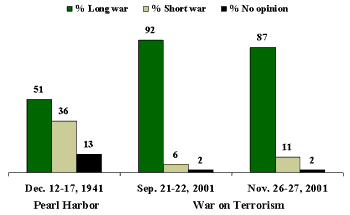 |
| Nov. 26-27, ‘01 |
- There has been increasing discussion about the possibility of expanding the war on terrorism to include new military action in Iraq. On Monday, President Bush reiterated that the war on terrorism would include any nation that made weapons of mass destruction, and demanded that Iraq let weapons inspectors return. The American public is increasingly supportive of the idea of widening the war to include Iraq. Three-quarters of Americans in the Nov. 26-27 poll favor sending Americans troops back into the Persian Gulf in order to remove Saddam Hussein from power. This is similar to June 1993 responses, but marks a significant increase from last February, when only 52% said that the United States should attempt to remove Saddam Hussein from power.
- Fifty-four percent of Americans say, when given a choice, that it would be better for the United States if Osama bin Laden were to be killed, while 43% say it would be better if he were to be captured alive.
| Which comes closer to your view -- [ROTATED: the U.S. accomplishments in Afghanistan will be a success even if Osama bin Laden is not captured, (or) the U.S. accomplishments in Afghanistan will not be a success until Osama bin Laden is captured]? |
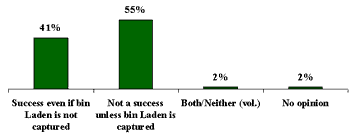 |
| Nov. 26-27, ‘01 |
- Eight out of 10 Americans say they have "no doubts whatsoever" than bin Laden was behind the Sept. 11 terrorist attacks.
Survey Methods
These results are based on telephone interviews with a randomly selected national sample of 1,025 adults, 18 years and older, conducted Nov. 26-27, 2001. For results based on this sample, one can say with 95 percent confidence that the maximum error attributable to sampling and other random effects is plus or minus 3 percentage points. In addition to sampling error, question wording and practical difficulties in conducting surveys can introduce error or bias into the findings of public opinion polls.
